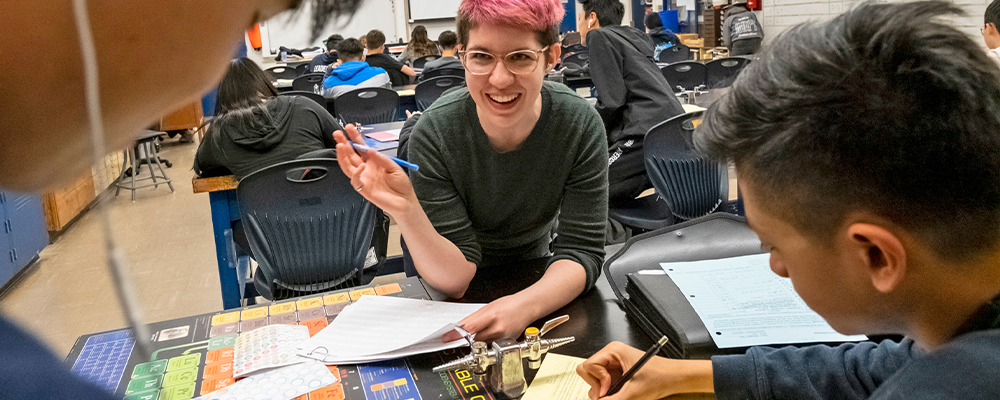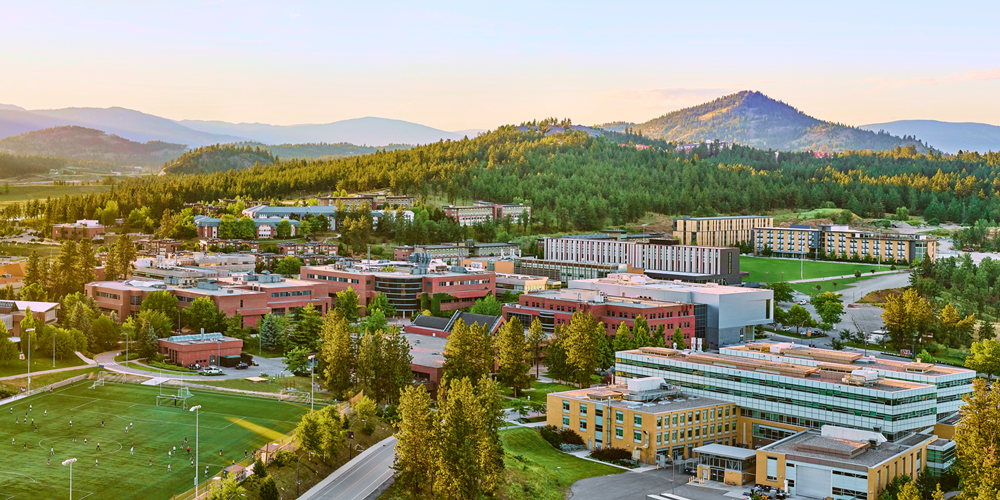Teaching English and Additional Languages Certificate

Program
Certificate
Length
12 months
Faculty/School
Okanagan School of Education
Why study TEAL at UBC’s Okanagan campus?
Gain the essential skills needed to thrive in the dynamic field of language education with our Teaching English and Additional Languages (TEAL) Post-Baccalaureate Certificate (12 credits). Our comprehensive curriculum covers lesson planning, effective teaching methods, language awareness, classroom management, curriculum design, and much more. You’ll explore key topics like language learning theory, intercultural communication, motivation strategies, and the latest educational technology. The TEAL certificate ensures you’re fully equipped to inspire and engage language learners locally and around the world. It is designed to prepare students who are new to teaching as well as offer professional development for current teachers or those who have previous experience working with additional language learners in Canada or abroad.
Hands-On Experience with a Supervised Practicum
Experience the classroom with our hands-on practicum. Under expert guidance, you’ll apply what you’ve learned in a real-world teaching environment, gaining invaluable teaching experience that will boost your confidence and skills.
Learn from Experts in Language Education
Our program is taught by highly qualified instructors who bring real-world expertise and passion for teaching English as an additional language. Whether through face-to-face or online instruction, you’ll receive a high-quality education from experienced professionals dedicated to your success.
Earn a Globally Recognized Credential
This globally recognized qualification will open doors to teaching opportunities worldwide, making you a competitive candidate in the growing field of language education.
Careers and outcomes
Students completing this certificate may wish to teach English as an additional language in another country after their undergraduate degree, work in adult or post-secondary contexts teaching English language learners (ELL) or other languages in Canada, or develop their instructional skills for teaching in heritage language schools. For teachers in K-12 classrooms, this certificate can deepen their understanding of language acquisition, language awareness, and socio-cultural factors that affect learning.
Please note that this certificate does not lead to teacher certification to teach in public K-12 schools in British Columbia. In B.C., a Bachelor of Education is required to teach in public K-12 schools.
schedule and courses
The certificate consists of four three-credit courses, representing a minimum of 144 hours of instruction and including a supervised practicum with 10 hours of observation and 10 hours of teaching.
Courses take place online and on-campus. The certificate (12 credits) is awarded after successful completion of LLED 494, LLED 495, LLED 496, and LLED 497 (in-person). These courses may be taken in any order or sequence. Generally, one course is offered in each term (W1, W2, S1, S2), with students able to complete all four courses in a 12-month period.
Language teaching methods, instructional skills in English, and motivational design are examined. Sociocultural factors and language acquisition are explored with a focus on teaching and assessing listening, speaking, reading, writing, grammar, and vocabulary. Pass/Fail.
Grounded in English and additional language teaching and learning across age and proficiency levels, sociocultural considerations are taken into account while exploring curriculum, lessons, materials, technology, interaction, and classrooms. Professional development and social justice are examined, with an emphasis on language teachers as scholar-practitioners. Pass/Fail.
Intended for a wide range of educators, this course conceptualizes additional language acquisition theory from multiple angles in child, adolescent, and adult contexts. Key issues, concepts, and theoretical perspectives are evaluated and explored with emphasis on current empirical research. Pass/Fail.
Professional development as an additional language educator through a supervised 20-hour practicum including guided lesson observations (10 hours) and focused teaching practice (10 hours). Concurrent seminars develop skills in lesson planning, instructional strategies, reflective practice, classroom leadership, interculturality, and community building. Pass/Fail.
This course requires in-person attendance.
Admission Requirements
- Students who wish to enroll in the certificate program must have obtained their first degree or a minimum of third-year standing.
- If you are a current UBC student of third-year or more standing who wishes to enrol in just one or two courses, and not complete the post-baccalaureate certificate, you do not need to apply.
- Applicants who speak English as a second language and have not previously been enrolled at UBC or another Canadian university must demonstrate English language proficiency to meet UBC’s English Proficiency Requirements.
how to apply
Current UBC Okanagan Students
Applications to the certificate are accepted on a rolling basis throughout the year, with accepted students able to start their studies in the term following their acceptance into the program.
New to and Returning UBC Students
Once we have reviewed your application we will send you the appropriate next steps to completing your application.
Please ensure you complete the application prior to the deadline.
Dates and Deadlines
| Intake | Apply Before |
| September | July 1 |
| January | November 1 |
| May | March 1 |
Once your eligibility to register has been established, you will receive an email from Access Studies.
For more information please contact postbac.education@ubc.ca.
Registration & Course Selection
Students may then register for each course online through Workday Student.
Upcoming courses can be viewed on the Certificate & Diploma Student Resource page.
Tuition & Fees
Students will be assessed tuition and student fees at the prevailing undergraduate rate.
Tuition amounts presented here are estimates* only and all fees are subject to change.
| Program | Domestic | International |
| Certificate (12 credits) | $2,707.08 | $13,259.88 |
Plus any applicable student fees, textbook, and other associated costs.
MORE INFORMATION
Visit the UBC Okanagan Academic Calendar* for full admission and program requirements; the calendar is a comprehensive guide to all programs, courses, services and academic policies at the University of British Columbia.
* In case of a discrepancy between this webpage and the UBC Calendar, the UBC Calendar entry will be held to be correct.
Teaching English as a Second Language vs. Teaching English as a Foreign Language
TESL, TEFL, TESOL, and TEAL: What’s in an acronym?
The acronyms related to Teaching English as a Second Language (TESL), Teaching English as a Foreign Language (TEFL), Teaching English to Speakers of Other Languages (TESOL), and Teaching English as an Additional Language (TEAL) are often used interchangeably when referring to certificate programs that prepare people to teach English as an additional language (EAL) to students from other language backgrounds. In general, TESL refers to teaching EAL in contexts where English is the day-to-day or official language, and TEFL refers to teaching EAL in contexts where another language is the most common or official language. TESOL and TEAL are more comprehensive terms, and they can refer to teaching EAL in a wide range of contexts. UBC’s Okanagan School of Education uses the term TEAL for its programs because it includes TESL, TEFL, and TESOL contexts and prepares students to teach EAL and other additional or heritage languages both in Canada and abroad.
DISCOVER THE OKANAGAN
A diverse natural region with sandy beaches, beautiful farms, vineyards, orchards and snow-capped mountains, the Okanagan is an inspirational landscape perfect for those seeking leisure or outdoor adventure.
UBC’s Okanagan campus borders the dynamic city of Kelowna, a hub of economic development with a population of more than 150,000 people— the fourth fastest-growing population in Canada.
